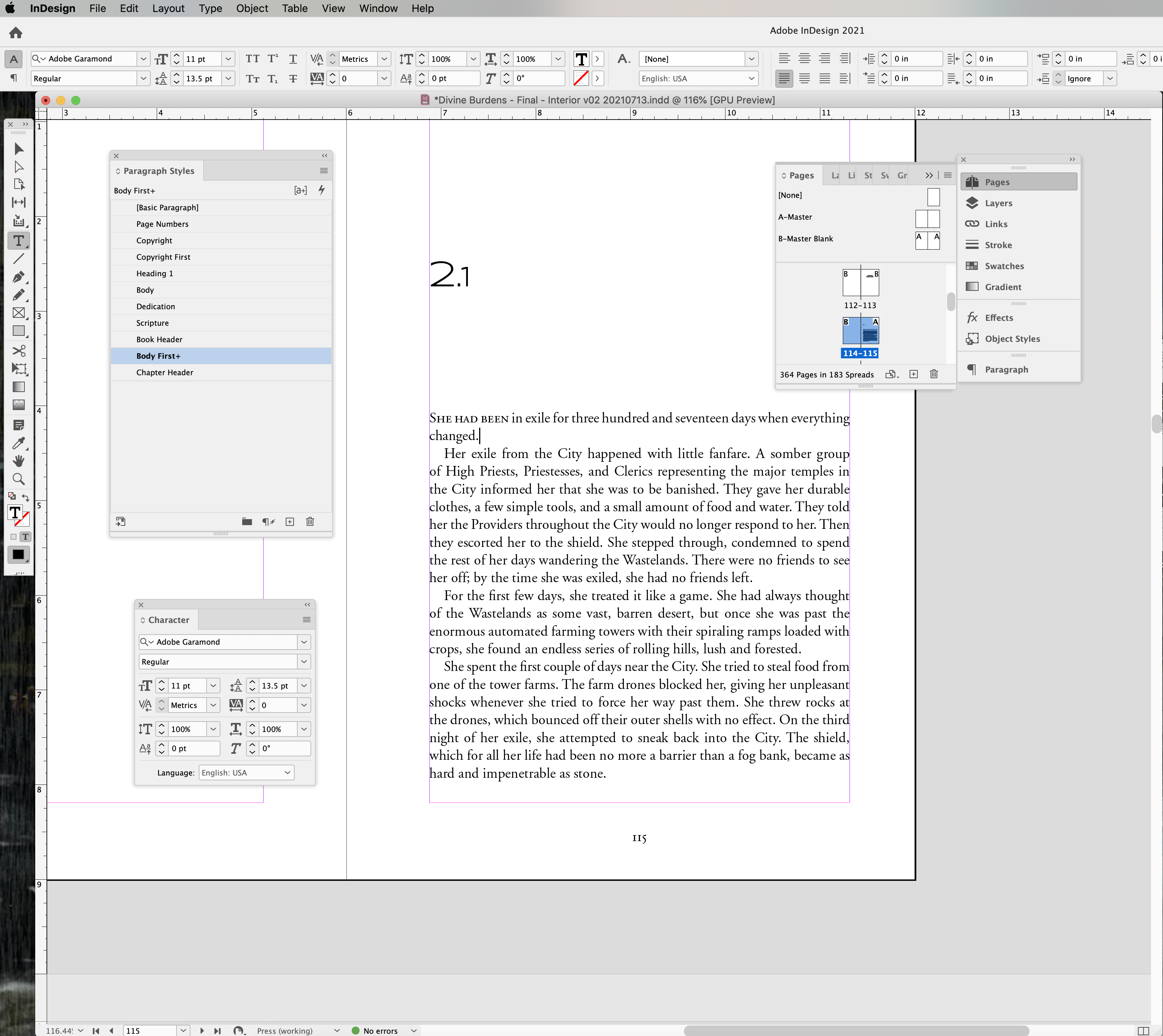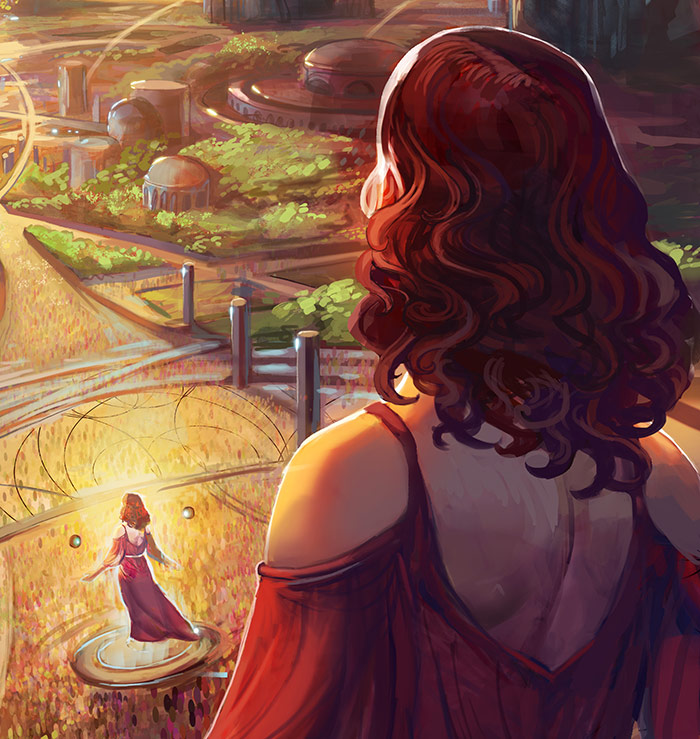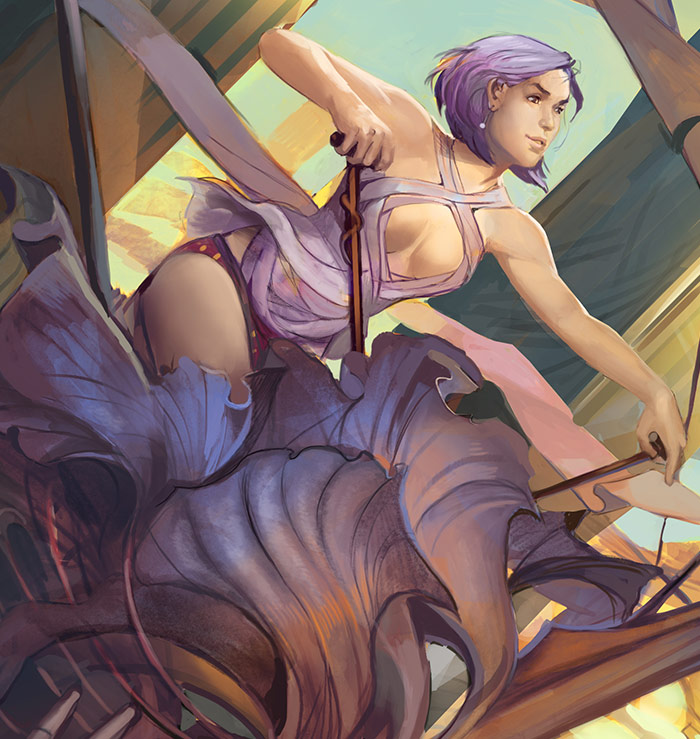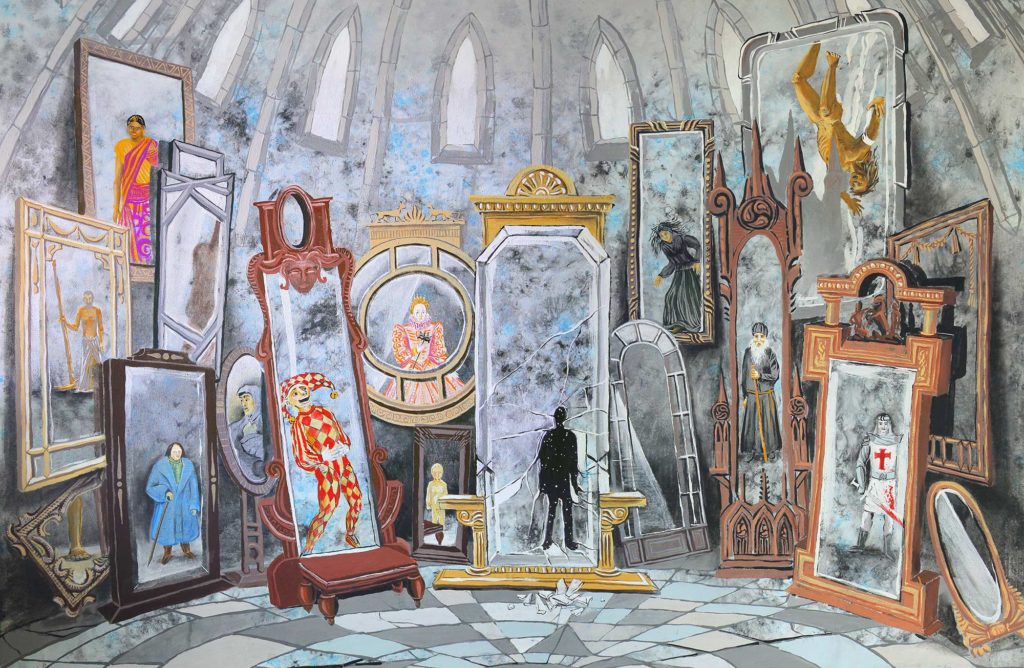“That wasn’t nice, what you did to me during the Hunt,” Brin said. “I hallucinated for hours after I woke up.”
“You weren’t nice to me,” Lija said.
“Yeah, but I was a Hunter!” Brin protested. “Hunters aren’t supposed to be nice!”
Lija bit Brin’s bare shoulder. “Some prey fights back.”
Brin wriggled against her. “Don’t I know it.”
—from Divine Burdens

The society of the Passionate Pantheon is built on a foundation radically different from anything in the real world, which is perhaps not too surprising when you consider it’s ruled (insofar as ‘ruled’ is an accurate term in a post-scarcity society where everyone has freely-available access to all the necessities of life and luxury) by hyper-intelligent AIs that are worshipped through ritualized sex. We wanted to explore what might happen in a society where the way we think about sex and connection are completely flipped upside down from the attitudes you typically see in the Western societies we’re both familiar with.
We’ve talked quite a bit about how the historical foundations and cultural expectations of the City might change the way people think about consent, particularly sexual consent. But there’s another huge difference between their society and ours: their views on trauma and responses to trauma.
Divine Burdens is erotic horror (with a strong emphasis on horror). We’ve talked about that before, but we need to put it up front: this book is not Utopian. It’s still post-scarcity, and it’s still built on a foundation of consent (albeit somewhat loosely interpreted; the difference between enthusiastic consent, technical consent, and transactional consent is one of the themes we set out to explore with this book.) However, characters experience things that would, in the real world, probably be traumatic. And, for the most part, they shrug them off. It’s a horror for us, not for them. And, perhaps somewhat strangely, even though this book is deliberately written as horror, the protagonists still have lives that are, by any objective standard, better, safer, and more comfortable than ours (perhaps that’s worthy of a blog post of its own?).
Why? How could that be? Is that realistic? We think it’s a reasonable premise, for at least two major reasons: trauma is often contextual—your society defines and describes what you might consider traumatic—and the citizens of the City have a cast-iron, bedrock assumption built on a lifetime of experience that the gods are—in a literal, tangible, physical sense—always watching out for them, and unlikely to allow them to come to real harm.
Which is not to say that it’s impossible to experience trauma in the City; far from it. In book four of the Passionate Pantheon series, tentatively titled Unyielding Devotions, we explore three characters who have the same experience that many people in the real world might find traumatic, and come away from it affected in radically different ways. One of the protagonists of Unyielding Devotions is traumatized by his experience, and that trauma becomes the driving force for his character arc. We don’t want to suggest you can’t experience trauma as a citizen of the City, only that the culture that surrounds you informs your perception of, and response to, trauma.
So what do we mean when we talk about trauma?
The dictionary defines trauma as “a deeply distressing or disturbing experience.” Of course, one person’s deeply distressing and disturbing incident is another’s fun Saturday night, so there will always be wildly different individual responses to any experience.
But what would it mean if, from the day you were born, you had a literal, physical connection to the gods, in the form of a drone who was your friend, confidant, and guardian, who not only taught you to navigate life but also kept you safe from harm? Including standing up for you against your human carers, if that was necessary?What would it mean if, from a very young age, you had a much higher degree of autonomy than children do in the real world, where we effectively treat children as property? What would it mean if you knew with absolute certainty that if you ever got yourself into trouble, or someone else ever tried to harm you, the gods would intervene promptly and decisively? What would it mean if you knew that you would never—could never—want for anything that threatened your survival? What would it mean if any injury that didn’t instantly kill you outright could be erased by a couple of hours, or in extreme circumstances, days, in a medpod?
This would, we think, change not only what you might be willing to consent to, but also your threshold for what counts as trauma.
In Divine Burdens, there’s a scene where a character is, totally against her will, bound in vines, injected with a massive dose of powerful hallucinogenic drugs, and then rendered unconscious for about a day. That would, to many people, probably be traumatic. But an important part of trauma is context—a person who breaks a leg by falling unexpectedly down a manhole cover on the way to the office will likely process this very differently than an extreme athlete who breaks a leg rock climbing or BASE jumping.
The character this happens to in Divine Burdens is an athlete (and not just any athlete, but one of the top five athletes in her society, their equivalent of an Olympic-level athlete). She participates in a sport where being dosed with hallucinogens, or breaking a bone for that matter, is something she knows might happen. In fact, being given mind-altering substances is an integral part of the very role she ferociously competes for.
Outside the cage, the room was packed with Hunters, most of whom Lija did not recognize. The Sacrifice attracted people from all over the City to participate. The ones she didn’t know didn’t worry her. They were amateurs; without training, they were unlikely to threaten her. Half of them wouldn’t even make it through the entire Hunt, but would end up twisting an ankle or falling and breaking a bone, and would have to be rescued by drones.
—from Divine Burdens
In the story, Brin’s experience with the vines and hallucinogens takes place during an act of religious worship. That, too, changes the way people perceive and process their experiences. Even in our world, people will deliberately subject themselves to incredibly intense experiences, up to and including mimicking the act of crucifixion or deliberately damaging their own flesh (without access to a medpod!), and the way they process that experience is completely different from the way they might process the same experience in a non-religious, non-self-chosen context. The Passionate Pantheon is a society where you choose your gods, consciously, as a fully-grown adult, and you choose which of your religion’s rituals you participate in. So how much more fervent and dedicated would someone like that be, in their spirituality? How much more willingly would they endure intense and extreme acts of sacrifice for the god they worship?
Living in a society where you know the gods have your back, where you are free to participate or decline any experience (while we don’t directly address this until Unyielding Devotions, worship of any of the gods is never mandatory, and people can and do decline to participate in the religious rituals of the City), and where damage or injury can be wiped away by advanced biomedical nanotechnology, would (we think) contribute to making people highly resilient in the face of (certain types of) trauma. Not unbreakable, not immune to trauma certainly, but quick to bounce back, and secure in the knowledge they would be okay.
Trauma, we argue, is largely about context, expectation, and feelings of vulnerability versus control. In a society where all three of these things are different from our world, people might process things differently.
From the point of view of someone reading the novels who grew up in contemporary Western society, the citizens of the City might seem to possess superhuman constitution. And that’s perhaps what makes them seem a bit alien, like far-future fey folk. An argument might be made that a more comfortable standard of living could go the other way, making people more rather than less susceptible to trauma, because as people become more comfortable and society becomes safer, they have less opportunity for exposure to potentially traumatizing events.
But there’s a difference between experiences that are self-chosen, that you sign up for, and things that happen to you. There are experiences many of us in the real world experience every day and often brush off as insignificant or common that people of the City might find incredibly traumatizing.
We accept a certain level of non-consensual access to us—in mind and body—that residents of the City would find absolutely horrifying. From servers at a restaurant being groped, to clerks being abused at the retail counter of a shopping mall, to the way that sex workers are treated as a matter of course, there’s a background level of…let’s call a spade a spade, violence…that is totally normalized in our society. In many ways we don’t even think about how awful this is, but those sorts of experiences would be horrific to someone from the Passionate Pantheon world.
Even surgery the way it’s practiced here, where you’re anesthetized and then sliced apart with a knife, would be horrifyingly traumatic to a resident of the City. Can you imagine, for a person who grew up with medpods, the trauma of being put to sleep and then waking up with the knowledge that someone else has physically cut into your flesh whilst you were unconscious, and you not only did not get to choose exactly what happened, but now you are expected to manage the pain and reduced mobility that you are left with? Often with the aid of medications that are, themselves, sometimes damaging, addictive, or whose side effects need to be mitigated with other medications? And on top of that, you are expected to be grateful to the people who did that to you!
So we’re certainly not saying that residents of the City have special immunity to trauma—their threshold of trauma might be higher in certain ways, but in other ways, because they don’t experience the kinds of small everyday violations we in this world are expected to put up with as part of the background noise of our lives, it might be lower. (The character Brin in Divine Burdens is, in an incredibly literal sense, a sexual predator—but an evening working at Hooters would probably utterly incapacitate her with trauma. In the City, her predatory activities are exclusively directed towards people who know the lay of the land and voluntarily sign up for it.)
And that’s only on an individual level. The residents of the City would also find horrifying and traumatic the idea that society as a whole treats certain classes of people—say, drug addicts, or sex workers, or racial or sexual minorities—as inherently lesser. Less valuable, less able to participate in civic institutions, less worthy of dignity and respect. People in the real world who are convicted of crimes, which is a situation that is viewed and managed in a fundamentally different way by the City, have their access to civic institutions revoked, something that the characters in the Passionate Pantheon would find shocking and appalling. (In Unyielding Devotions, we talk in more detail about how the City handles infractions of its rules, but one of the key points is that punishment for an infraction is immediate, short, appropriate to the crime, and truly wipes the slate clean—there is no lingering stigma, and no ongoing reduction in civic participation.)
In Divine Burdens, we wanted to tell a story that is, to our eyes, erotic horror, but explore how, in the context of that society, the characters normalize and accept the things that happen to them. One consequence of this is the characters in Divine Burdens would find our world, the real world, unacceptably, appallingly horrific.
And who’s to say that they’re wrong?





